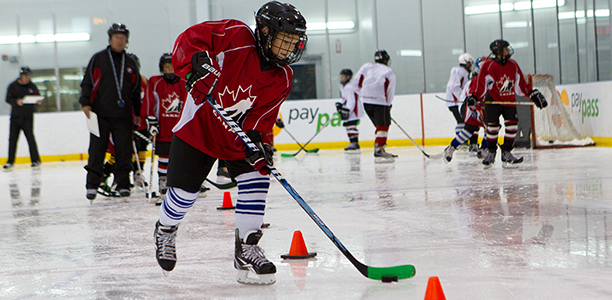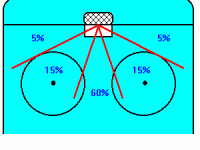Coaching Your Own Child in Minor Hockey: Pros and Cons
Minor hockey is an exciting sport not only for the children playing but also for the parents of the players. Fathers, mothers, sons, and daughters can all be part of a productive, fun activity that allows for plenty of family bonding. For many parents, the ultimate bonding experience is the ability to coach their own child’s hockey team.
Most minor hockey teams are coached by the parent of someone on the team. This personal relationship can be beneficial for both the parent and the child, but there are pros and cons to coaching your own kid’s team. Read on to determine if this is something that you might be interested in.
Pros of Coaching Your Child’s Hockey Team
Quality Time and Bonding
With many families living very busy lives these days, it can be difficult to allocate quality time to spend with your kids, especially with the demands of a sport like hockey. If you coach your child’s team, you get to spend quality time with him or her while helping to develop skills and knowledge. There is a shared joy with each success that comes throughout the season.
While older children may express a desire to get away from parents, this is a great time for younger children to learn from their family coach. With all the requirements of work, the parent gets to take some time away from the real world and spend more time with their child while the kid gets to enjoy his or her favorite sport.
Creating Memories
Any coach has the ability to create memories for his or her team, and these become even more special when you get to share them with your child. Whether it is winning a championship with the whole team or simply laughing during warmups, these are great life moments that your child is sure to hang onto for a long time. It’s always nice to share in your kid’s passion, and they’ll be thankful that you are part of these fantastic memories.
You Know Your Child Best
Another advantage of coaching your child is that you know their strengths and weaknesses and will be better equipped to deal with their personalities than another coach might. This may be beneficial for your kid as it will allow them to adjust to the league faster and to reduce the amount of stress put on them. Instead of needing to take extra time to learn how your child reacts, you will already be in a position to make the best decisions and take actions.
Cons of Coaching Your Child’s Team
Preferential Treatment
As much as you might tell yourself that you won’t give your son or daughter any preference, it is difficult for parents to actually follow through with this. Many parent coaches end up giving their kid more playing time and putting them in the more important in-game situations. This is harmful to the development of other players on the team.
Strained Relationships
If other players feel that your kid is getting this preferential treatment, it can lead to resentment throughout the team. Your son or daughter may not be invited to extra-curricular outings, or they may become the target of ridicule from other players. Often, this can lead to a downturn in performance as your child loses confidence and feels that they are not wanted on the team, or that they are getting playing time not because of their skill level but only because they are the coach’s kid.
Added Stress
Although some kids feel relieved of pressure when their parent is coaching, many actually find themselves under additional stress. This is because a parent might have higher expectations for them and as such will treat them with more criticism and assign more responsibility to them. The parent coach may be a little harder on them than they are on other kids simply because he or she feels more comfortable doing so. This again can lead to negative results as your kid finds himself pressing to play better rather than developing naturally and having fun.
How to Find Balance as a Parent Coach
Although there are many ways that a parent coaching situation can turn negative, the pros outweigh the cons as far as being a positive influence on your child’s life. There are some steps you can take to ensure that you don’t fall into the trap of showing favoritism or that your child doesn’t feel uncomfortable with you as the coach.
Separate Parenthood from Coaching
This is easier said than done, but many parents have found success by committing to be a coach when its time and reverting to parenthood after a practice or game. Treat your son or daughter’s name as just another player on the roster when it comes time to make lines and strategies. If they need a break due to fatigue or diminished performance, treat them exactly the same as you would any other child. You may not feel right doing so, but your child will appreciate your efforts. Once the game is over, then you can go back to being a parent.
Talk to Your Child About the Situation
Make sure to set clear expectations for your child about your plan for coaching them. Let them know that they won’t be getting preferential treatment nor will you be any harder on them than you are on other players. Make sure they understand that you want to help them develop as a player but that you also have a job to do for the entire team.
Communicate with Other Parents and Children
It is important to be transparent about your coaching relationship and to keep other parents and children involved. You don’t have to try to do too much as a coach, but it should be clear that you have the team’s best interest in mind and that you aren’t here only as a bonding experience with your child. That is certainly a benefit, but it is not one of your responsibilities.






